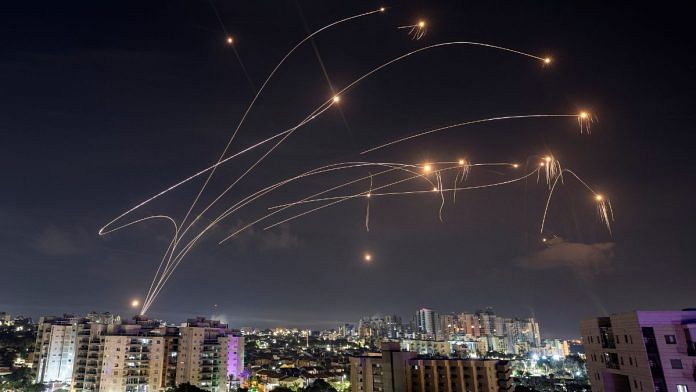Saturday mornings are usually quiet in Israel. But the last one, when the week-long Sukkot holidays ended, wasn’t. Many people were heading to synagogues for Simcha Torah prayers early in the morning when rocket sirens rang all over southern and central Israel, even in big cities like Tel Aviv and Jerusalem. Everybody rushed out of their homes. Living in and around Tel Aviv for the past two years, I knew well, like the local residents, the usual escalation pattern of fights between Israel’s army and Hamas, Palestinian Islamic Jihad, and others. This time, no one around me in the bunker room knew why rockets were launched. In pyjamas, we were checking the news on our phones. There was no news alert about the rockets.
Hamas and Islamic Jihad from Gaza caught Israel by surprise—they launched an all-out attack by air, land, and sea. The military intelligence didn’t have any early alerts, and the army deployment on the border with Gaza was too thin.
The early morning barrage of rockets was a distraction as hundreds of armed militants of Hamas entered Israel, taking over a military post and a police station, getting into gated kibbutzim and moshavim (communal collective towns/villages), driving through major roads and neighbourhoods in pick-up trucks mounted with automatic guns. The infiltration was massive; even a journalist from Gaza came along with the militants to report the situation in Israel
It took a few hours for the Israeli army to even report from the different locations and give official statements to the radio stations or media. After seven hours, Prime Minister Benjamin Netanyahu told Israelis that the country was at war.
Israel has not come under such a massive attack since the October War of 1973, known as the Yom Kippur War. That war was a setback for Israel, as it was neither preempted nor won. Israel barely escaped defeat. Precisely 50 years since then, Israel seems to have neither anticipated nor prepared for this attack. It is as much an intelligence failure as an operational defeat at the border.
In less than 24 hours, Israel lost more than 300 people, including soldiers and officers of the army, and more than 1,800 people have been injured. Worse, there are hostage situations in multiple locations in southern Israel where armed militants have taken over Israeli homes. Some Israelis have been abducted and taken into Gaza—that count is still awaited.
Also Read: Netanyahu vs judiciary exposed Israel to the most severe crisis. US & allies will stay away
A divided Israel
Hezbollah from Lebanon, Hamas, or Islamic Jihad from Gaza may have sensed that Israel is deeply divided.
For the past four months, Defence Minister Yoav Gallant has been warning PM Netanyahu that his controversial judicial reform is ripping national cohesiveness and security apart. He has been deeply concerned about the military’s operational capacity in light of the army’s pilots, intelligence, and navy personnel refusals. The prolonged political crisis in Israel certainly distracted the defence minister, who was busier in building consensus among his peers in the cabinet or convincing the reserve soldiers not to take political positions.
He did not miss to warn Hezbollah and Lebanon in August to “not make a mistake”. “We do not want war, but we are ready to defend our citizens, our soldiers, and our sovereignty,” he had said. He was right in preempting an opportunistic move by these groups against Israel. Yet he failed in preparing the army against such a scenario. He certainly underestimated Hamas and Islamic Jihad from Gaza, thinking that Iron Dome would stop their country-made rockets, as usual. He was a lonely voice defending the vitality of the army and its preparedness for Israel, while other ministers thought his warnings were exaggerated. Netanyahu was too busy fighting for his political survival and the legal battles against the courts.
Also Read: How Al-Aqsa mosque, 3rd holiest site in Islam, became focal point of Israeli-Palestinian tensions
The upper hand
Israel is still in shock, a looming fear of a repeat of the Yom Kippur War hangs in the air. The army has not yet reached all the places where militants were shown roaming free; some sources estimate there are still 60 in southern Israel. In more than 7 places, all residential areas, the army is in a direct gunfight with them. Only when Israel takes control of its territories can it think of a strategy to rescue those who have been abducted and taken to Gaza. Till the captives remain in Gaza, Israel’s retaliation policy won’t work.
Hamas and Islamic Jihad have had the upper hand thus far—their strategy worked, the execution was quick, and Israel is yet to get back to its feet. This war will not end soon, though Islamic Jihad and Hamas spokespersons have said they want all their prisoners freed from Israeli jails in return for the abducted Israeli civilians. The ordinary Palestinians in Gaza will pay a heavy price for the misadventures of their self-appointed, violent rulers like Hamas and Islamic Jihad.
Dr Khinvraj Jangid writes from Tel Aviv. He is Associate Professor and Director, Centre for Israel Studies, Jindal School of International Affairs, OP Jindal Global University, Sonipat. He is visiting faculty at Ben-Gurion University of the Negev, Israel. Views are personal.
(Edited by Theres Sudeep)



